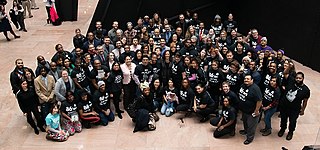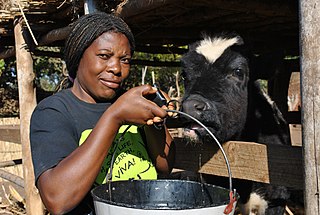Related Research Articles

The United Farm Workers of America, or more commonly just United Farm Workers (UFW), is a labor union for farmworkers in the United States. It originated from the merger of two workers' rights organizations, the Agricultural Workers Organizing Committee (AWOC) led by organizer Larry Itliong, and the National Farm Workers Association (NFWA) led by César Chávez and Dolores Huerta. They became allied and transformed from workers' rights organizations into a union as a result of a series of strikes in 1965, when the mostly Filipino farmworkers of the AWOC in Delano, California, initiated a grape strike, and the NFWA went on strike in support. As a result of the commonality in goals and methods, the NFWA and the AWOC formed the United Farm Workers Organizing Committee on August 22, 1966. This organization was accepted into the AFL–CIO in 1972 and changed its name to the United Farm Workers Union.

Service Employees International Union (SEIU) is a labor union representing almost 1.9 million workers in over 100 occupations in the United States and Canada. SEIU is focused on organizing workers in three sectors: healthcare, including hospital, home care and nursing home workers; public services ; and property services.
Richard B. Berman is an American lawyer, public relations executive, and former lobbyist. Through his public affairs firm, Berman and Company, he runs several industry-funded non-profit organizations such as the Center for Consumer Freedom, the Center for Union Facts, and the Employment Policies Institute.
Social movement unionism (SMU) is a trend of theory and practice in contemporary trade unionism. Strongly associated with the labour movements of developing countries, social movement unionism is distinct from many other models of trade unionism because it concerns itself with more than organizing workers around workplace issues, pay and terms and conditions. It engages in wider political struggles for human rights, social justice and democracy. Social movement unionism grew out of political struggles in developing countries and was theorized as a distinct industrial relations model in the late 1980s and early 1990s.
Community unionism, also known as reciprocal unionism, refers to the formation of alliances between unions and non-labour groups in order to achieve common goals. These unions seek to organize the employed, unemployed, and underemployed. They press for change in the workplace and beyond, organizing around issues such as welfare reform, health care, jobs, housing, and immigration. Individual issues at work are seen as being a part of broader societal problems which they seek to address. Unlike trade unions, community union membership is not based on the workplace- it is based on common identities and issues. Alliances forged between unions and other groups may have a primary identity based on affiliations of religion, ethnic group, gender, disability, environmentalism, neighborhood residence, or sexuality.

The Coalition of Immokalee Workers (CIW) is a worker-based human rights organization based in Immokalee, Florida, which focuses on the fields of social responsibility, human trafficking, and gender-based violence at work. Built on a foundation of farmworker community organizing starting in 1993, and reinforced with the creation of a national consumer network since 2000, CIW's work has steadily grown over more than twenty years to encompass several overlapping spheres:
Student/Farmworker Alliance (SFA) is a network of students and youth formally organized in 2000 in the United States. SFA campaigns for the improvement of working conditions in the agricultural fields of the United States. The organization cooperates with the Coalition of Immokalee Workers (CIW), a membership-led organization of mostly Mexican, Guatemalan and Mayan Indian immigrants working in agricultural and other low-wage jobs throughout the state of Florida.
The Koreatown Immigrant Workers Alliance 한인타운 노동연대, also known under its past name Korean Immigrant Workers Advocates 남가주 한인 노동 상담소, is a multi-ethnic immigrant worker civil rights membership organization based in the Los Angeles Koreatown area.
Worker centers are non-profit community-based mediating organizations that organize and provide support to communities of low wage workers who are not already members of a collective bargaining organization or have been legally excluded from coverage by U.S. labor laws. Many worker centers in the United States focus on immigrant and low-wage workers in sectors such as restaurant, construction, day labor and agriculture.
The Leadership Conference on Civil and Human Rights, formerly called the Leadership Conference on Civil Rights, is an umbrella group of American civil rights interest groups.

The Asian Pacific American Labor Alliance (APALA) is a nonprofit organization of Asian-Pacific American trade union members affiliated with the AFL–CIO. It was the "first and only national organization for Asian Pacific American union members".

The Coalition of Labor Union Women (CLUW) is a nonprofit, nonpartisan organization of trade union women affiliated with the AFL-CIO. The CLUW is a bridging organization that seeks to create connections between the feminist movement and the labor movement in the United States. The organization works towards overcoming past constraints and conflicts in pursuance of relationship improvement between those movements and thus enabling broad coalitions. The CLUW is the only national organization solely for women union members and is one of six constituency groups within the AFL-CIO. It is based in the headquarters of the AFL-CIO in Washington, D.C. CLUW pursues by four goals: to bring women into union leadership, to organise unorganized women workers, to bring women's issues onto the labor agenda, and to involve women into political action.
Justice and Witness Ministries (JWM) is one of five covenanted ministries of the United Church of Christ. JWM is responsible for national office ministries related to four areas: economic justice; "human rights, justice for women and transformation;" "public life and social policy;" and "racial justice".
The legal issues of Burger King include several legal disputes and lawsuits involving the international fast food restaurant chain Burger King (BK) as both plaintiff and defendant in the years since its founding in 1954. These have involved almost every aspect of the company's operations. Depending on the ownership and executive staff at the time of these incidents, the company's responses to these challenges have ranged from a conciliatory dialog with its critics and litigants to a more aggressive opposition with questionable tactics and negative consequences. The company's response to these various issues has drawn praise, scorn, and accusations of political appeasement from different parties over the years.
The Martin Luther King. Jr. County Labor Council, AFL–CIO, (MLKCLC) is the central body of labor organizations in King County, Washington. The MLKCLC is affiliated with the national AFL–CIO, the central labor organization in the United States, which represents more than 13 million working people. Over 125 organizations are affiliated with the MLKCLC, and more than 75,000 working men and women belong to Council-affiliated organizations. Not only does the MLKCLC support labor organizations, but it acts as a voice for the interests and needs of the working people in King County, WA.

The Restaurant Opportunities Centers United (ROC) is a not-for-profit organization and worker center with affiliates in a number of cities across the United States. Its mission is to improve wages and working conditions for the nation's low wage restaurant workforce. Its tactics and strategy have drawn fire from business groups and restaurant industry lobbyists.
The Fair Food Program (FFP) is a legally binding agreement between the Florida Tomato Growers and the Coalition of Immokalee Workers (CIW). It aims to provide Florida’s tomato workers with better wages and working conditions. The program has a list of six elements in order to ensure social responsibility and to create a strong partnership between workers, growers and buyers. The Fair Foods Standards Council (FFSC) oversees the program and ensures that standards are upheld. Big companies, including Taco Bell and Walmart have pledged to pay a penny more per pound of tomatoes and buy only from growers who comply with the program.
The Center for Organizational Research and Education (CORE), formerly the Center for Consumer Freedom (CCF) and prior to that the Guest Choice Network, is an American non-profit entity founded by Richard Berman. It describes itself as "dedicated to protecting consumer choices and promoting common sense." Experts on non-profit law have questioned the validity of the group's non-profit status in The Chronicle of Philanthropy and other publications, while others, including political commentator Rachel Maddow and author Michael Pollan, have treated the group as an entity that specializes in astroturfing.

Sarumathi "Saru" Jayaraman is an American attorney, author, and activist from Los Angeles, California. She is an advocate for fair wages for restaurant workers and other service workers in the United States. In the aftermath of September 11th, she co-founded the non-profit public service organization Restaurant Opportunities Centers United. And in 2013 she founded a new organization to work on these issues, called One Fair Wage. Jayaraman is a recipient of the Ashoka fellowship in 2013 and the Soros Equality Fellowship in 2020.

Farmworkers in the United States have unique demographics, wages, working conditions, organizing, and environmental aspects. According to The National Institute for Occupational Safety & Health in Agricultural Safety, there are approximately 2,112,626 full-time workers were employed in production agriculture in the US in 2019 and approximately 1.4 to 2.1 million hired crop workers are employed annually on crop farms in the US. A study by the USDA found the average age of a farmworker to be 33. In 2017, the Department of Labor and Statistics found the median wage to be $23,730 a year, or $11.42 per hour.
References
- ↑ "Most Food System Workers Have Low Wages, Few Benefits, Report Says" (PDF). The Bureau of National Affairs, Inc. A-13. 109 (418–2693). 6 June 2012.